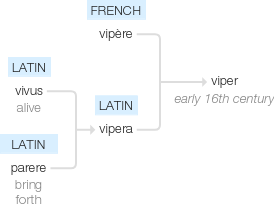Viper
early 16th century: from French vipère or Latin vipera, from vivus ‘alive’ + parere ‘bring forth’.
wiktionary
From Middle French vipere, from Old French vipre, from Latin vīpera, contracted from vīviparaf(“viviparous”, adj.), from vivus(“alive”, adj.) + parere(“to bear”, verb). Doublet of weever and wyvern.
etymonline
viper (n.)
early 15c., from Old French vipere, earlier in English as vipera (c. 1200), directly from Latin vipera "viper, snake, serpent," contraction of *vivipera, from vivus "alive, living" (from PIE root *gwei- "to live") + parire "bring forth, bear" (from PIE root *pere- (1) "to produce, bring forth"). In common with many snake species in cooler climates, in most cases the viper's eggs are kept inside the mother until hatching.
Applied to persons of spiteful character at least since 1590s. The only venomous snake found in Great Britain, but not especially dangerous. The word replaced native adder. "The flesh of the viper was formerly regarded as possessing great nutritive or restorative properties, and was frequently used medicinally" [OED]; hence viper-wine, wine medicated with some kind of extract from vipers, used 17c. by "gray-bearded gallants" in a bid "to feele new lust, and youthfull flames agin." [Massinger]
